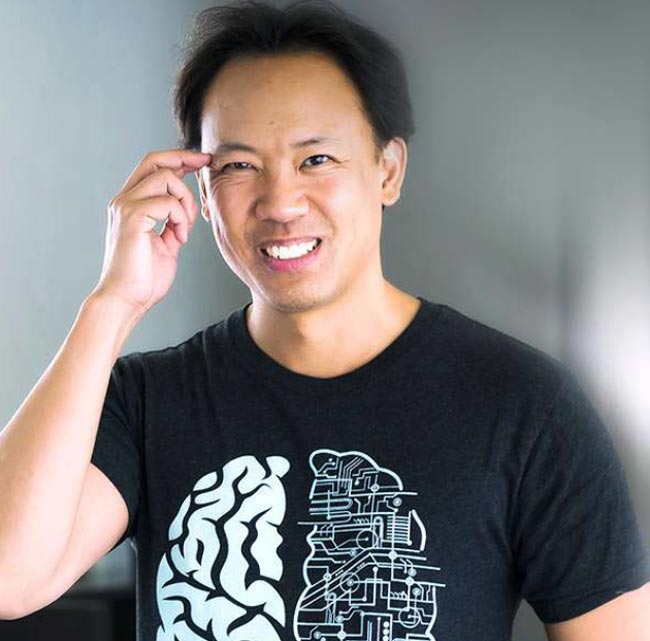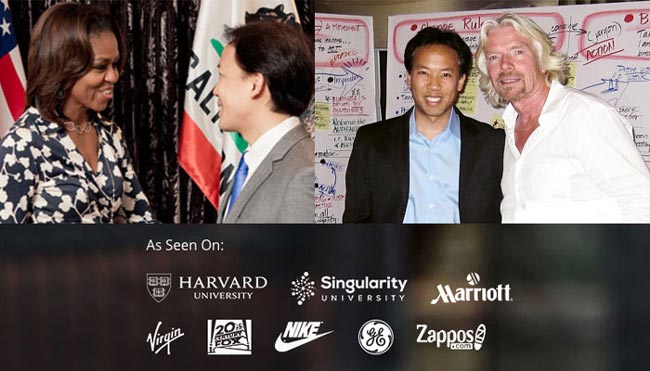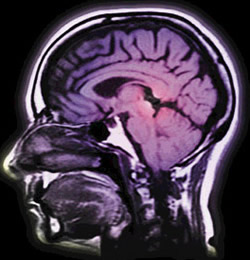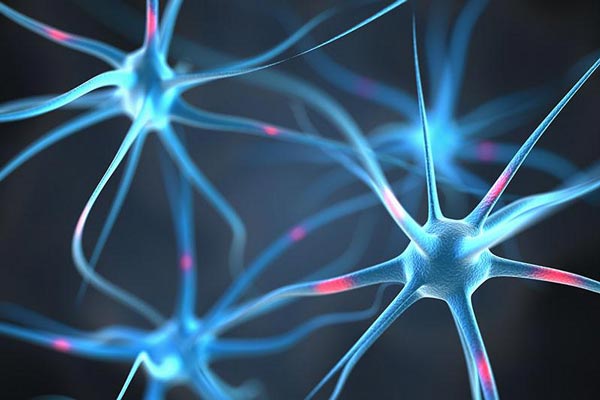Jim Kwik – the Superbrain teacher – first got my attention when I saw him interviewed in a short clip on YouTube and he spoke about learning being “state dependent”.
What he means by this is that learning is linked to an emotion: so learning plus emotion equals long-term memory.
The example he gave was that school is a negative experience for many people, and that learning in school is often not set in a positive emotional state.
Therefore the learning potential in school becomes limited, and much of what people learn in school they tend to forget fairly quickly as they grow up.
This makes sense to me because I did not have a very positive experience in high school, and I actually didn't learn that much from junior to high school.
The problem is that this sets the trajectory for our lives.
Those who don't do very well in high school tend to believe that they are not very good at learning and aren't cut out for academia; they leave the “clever stuff” to other people who they believe to be more mentally capable.
It was only in later life when I began to self-teach that I realized I did have the potential to learn and, as Jim suggests, that learning was set around a positive state: being deeply interested in something and wanting to know more about it.
So who is the Superbrain?

Who Is Jim Kwik?
The thing about Jim Kwik is that he really is just an average guy, albeit with a very interesting life story.
He suffered a brain injury as a child and as such his learning capacity was fairly limited.
But he was always interested in learning and, through comic books and superheroes, taught himself to learn and improved (healed) his brain. Fast forward to today and he teaches people to learn to speed-read, improve their decision-making skills, and unleash their superbrains (1).
He has worked with students at universities like NYU, Harvard, Columbia, Stanford, and Singularity, and companies like Nike and GE and Zappos, and rubs shoulders with the likes of billionaire businessmen Richard Branson and Elon Musk.
My Experience with the Superbrain Quest
Because I am interested in all things brain entrainment and brain optimisation, the Superbrain program intrigued me.
Human potential is something I'm really interested in and I'm a great believer that the large majority of us live our lives barely scratching the surface of our potential in so many areas.
Of course, there isn't time to learn everything we'd like to life and we only really get to choose one or two career paths in a lifetime. But being able to learn faster is a fantastic skill that means we can literally do more in life.
I read a lot of scientific studies on brainwave entrainment, nutrition, and health in general. I'm also interested in producing music and music technology.
With these things comes a lot of learning, because science and technology is always advancing.
This means taking a lot of information, and trying to process information and withhold that information can be very challenging.
Learning from Jim helped me understand how I can optimize my brain to operate on a higher plane.
The USP of Superbrain is to ‘learn faster, retain more, and forget less’. Who doesn't need that, right?
The course (or Quest as Mindvalley terms it) teachers the same techniques and information that Jim has used with the aforementioned universities and big companies.
The crux of the program is speed learning. The idea is you optimize your brain. Think your brain now, on steroids!
It's a holistic approach though, so unlike a simple speed reading course, you will learn how to think with clarity, and how to create a lifestyle conducive to optimal brain health – note that even the foods that you eat are super important.
How to Remember Names & Lists Like Jim
If you're interested in Jim Kwik then of course you're probably interested in his amazing skills of remembering names and lists, as he has demonstrated on stage on a number of occasions.
You won't be disappointed with Superbrain because he does teach those techniques, which are pretty cool party tricks!
But he goes a lot further than that and covers the specifics of brain processing power – based on neuroscience. So you will optimize your brain to think clearer, improve your problem solving skills, and your memory retention capacity (2).
There is also an emphasis on lifestyle. As we know, sleep is really important for brain performance and we can self sabotage by having a poor sleep routine and of course by eating foods that are not nutrient dense and may actually impair our memory function (3).

With Michelle Obama and Richard Branson
=> Click here to check out Superbrain
How to Get the Most Out of Superbrain
The course is 34 days long and is delivered via video.
It really is an active course, and the emphasis is on being active. And as you see from the next section in this review that word is a core part of Jim's system.
It's not something that you should just watch and do nothing with. What I suggest is that you actively practice the techniques and implement the routines while following the course.
What I mean by that is let's say for example that you are studying a course at the moment, perhaps a university course or maybe you are learning a language, or like me you are constantly reading books and papers at home with the intention of writing articles or even a book.
You can apply the course techniques to this work as you go along.
The key is to keep an open mind and test things out to see if you can make small gains.I know from experience that with any form of brain optimization it's the small adjustments that can make the most difference in the long-term; but you may not initially see it that way in the short-term.
One example of this in my own life is taking turmeric. It has long been said that turmeric can help improve memory and prevent cognitive decline.
But research shows that this isn't something you're going to benefit from in just a few days from taking a small amount of turmeric, so this is something I do every day by adding it to my chicory and barley coffee replacement drink (1). The benefits are progressive and cumulative.
If knowledge is power, learning is a superpower. — Jim Kwik
The F.A.S.T System
Jim Kwik's system of learning is based on a system he calls the F.A.S.T system.
I'll run through each letter of the system to explain this. Each letter represents an aspect of the way in which you should learn.
Forget:
Forget? I'm here to remember!
LOL. I know, but this is interesting.
The idea is that you start with a beginners mind. This term is often used in the world of mindfulness and meditation.
The idea is to be present and disregard/forget what you already know, and indeed your limitations and expectations of yourself. Because again, as previously mentioned, these things are linked to our past experiences and in particular our childhood.
Negative experiences around learning in our childhood years prevent us from learning in adult hood because we believe that we aren't capable of learning to a high level and becoming an expert in a particular subject.
When you think about this it has deep ramifications for our lives: Many of us avoid certain career choices because we believe such choices to be reserved for people with a greater learning capacity.
We think certain choices are for those who are really good at retaining information and passing exams, the type of person who always has their nose in books.
Furthermore, some people go through their lives avoiding conversations on subjects such as politics or history because they don't want people to think they are unintelligent when giving a particular opinion or for not knowing a particular fact.
But what most of us fail to realize is that our learning potential is really limitless. In fact, no one actually knows what the human learning potential threshold is.
Active:
As Jim Kwik often says, “Learning is not a spectator sport.”
By this he means that we need to get involved in learning and be creative. Simply sitting back and listening to podcasts or even teachers isn't enough.
We need to develop our minds by understanding how we best learn, be that by taking notes or memory hacks – and additionally making changes to lifestyle.
Like anything in life, if you want to become a great learner of a particular subject matter, then you need to involve yourself in active learning.

Jim Kwik with some pretty big stars.
=> Click here to check out Superbrain
State:
We covered this at the beginning of the post but to summarize: high-level learning and information processing is much easier when we are in the right emotional state.
When we are at school learning subjects that we have no interest in we are unlikely to be able to retain enough information to pass an exam in that particular subject.
Yet when we are excited about what we are learning, and when we are positive and committed to learning, we are more likely to retain information and push the boundaries of our potential.
Ever notice how you tend to remember the names of people you find attractive much more easily?
Teach:
This last point is so simple yet something I've never really contextualized in this way.
If you learn something as if you're going to teach it to someone else, then when you teach it to someone else you're effectively learning it twice.
It's really interesting and you should try this today.
Think of something that captivates your interest, it could be a certain person such as a historical figure or someone in the modern day like an actor or a sports personality.
Look up some information on this person, and when you're reading the information digest it with the intention that you are going to have to teach someone else about it.
You will automatically find yourself picking out the key facts and organizing them as if you were going to tell somebody else.
You can do this in your mind or you can write it down and make notes.
But what's interesting is that you slip into a different mode of learning when you do this; it's as if it really matters and pushes you to a higher level of learning so that you can relay the information to someone else.
I'm not sure exactly why this is but i think it's because you have an extra incentive to learn the information because you're going to share it, and the fact that you want the information that you share to be correct.
It's not about mental intelligence it's about mental fitness – Jim Kwik
Getting Started with the Free Class
The Superbrain quest is provided on the MindValley Quest platform. The big plus point of this is that you are learning alongside other people, so to speak.
You're encouraged to share your journey with others in the community and this is mainly done through the private Facebook group.
If you're interested you can learn 10 Powerful Superbrain hacks from Jim in a free masterclass – you don't have to sign up for the course to do this.



Leave a Reply